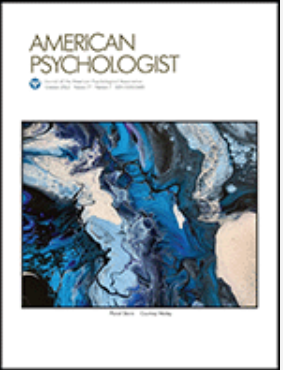Parenting in childhood predicts personality in early adulthood: A longitudinal twin-differences study.
IF 12.3
1区 心理学
Q1 PSYCHOLOGY, MULTIDISCIPLINARY
引用次数: 0
Abstract
Personality traits such as openness, conscientiousness, and agreeableness predict important life outcomes, and fostering them is therefore a major policy goal. A key modifiable factor that is thought to influence personality is the parenting individuals receive when they are young. However, there is little empirical evidence on the potential impact of parenting on personality traits beyond early adolescence, particularly using causally informative designs. Here, we tested whether mothers' affection toward their children between ages 5 and 10 predicted Big Five personality traits at age 18, when young people leave the structured environment of secondary school and make an important transition to work or further education. We used a prospective longitudinal twin-differences design that compares identical twins growing up in the same family to rule out key confounders and strengthen causal inference. Participants were 2,232 British twins (51.1% female) who had been followed from birth to age 18 as part of the Environmental Risk Longitudinal Twin Study. Twins who had received more affectionate parenting during their childhood years were rated as more open, conscientious, and agreeable young adults by research workers, even when compared with their genetically identical cotwins. There were no differences in extraversion and neuroticism. Associations were small, but they survived stringent robustness checks, including controlling for reporting source, childhood maltreatment, child effects on parenting, and family support at age 18. Our findings suggest that interventions to increase positive parenting in childhood have the potential to make a positive population-wide impact through small but sustained effects on personality traits. (PsycInfo Database Record (c) 2025 APA, all rights reserved).童年时期的父母教育可以预测成年早期的性格:一项纵向双胞胎差异研究。
性格特征,如开放性、严谨性和亲和性,预示着重要的生活结果,因此培养它们是一个主要的政策目标。人们认为影响个性的一个关键的可改变因素是个体在年轻时所受到的养育。然而,很少有经验证据表明父母教养对青春期早期以后人格特征的潜在影响,特别是使用因果信息设计。在这里,我们测试了母亲在5到10岁之间对孩子的感情是否能预测18岁时的大五人格特征,当年轻人离开中学的结构化环境,进入工作或继续教育的重要过渡阶段时。我们采用前瞻性纵向双胞胎差异设计,比较在同一家庭中长大的同卵双胞胎,以排除关键混杂因素并加强因果推理。参与者是2232对英国双胞胎(51.1%为女性),作为环境风险纵向双胞胎研究的一部分,他们从出生到18岁一直被跟踪。研究人员认为,在童年时期受到更多关爱的双胞胎在成年后更开放、更有责任心、更和蔼可亲,即使与基因相同的双胞胎相比也是如此。在外向性和神经质方面没有差异。关联很小,但它们通过了严格的稳健性检查,包括控制报告来源、儿童虐待、儿童对父母的影响和18岁时的家庭支持。我们的研究结果表明,通过对人格特征的微小但持续的影响,在儿童时期增加积极的养育方式的干预有可能在整个人群中产生积极的影响。(PsycInfo Database Record (c) 2025 APA,版权所有)。
本文章由计算机程序翻译,如有差异,请以英文原文为准。
求助全文
约1分钟内获得全文
求助全文
来源期刊

American Psychologist
PSYCHOLOGY, MULTIDISCIPLINARY-
CiteScore
18.50
自引率
1.20%
发文量
145
期刊介绍:
Established in 1946, American Psychologist® is the flagship peer-reviewed scholarly journal of the American Psychological Association. It publishes high-impact papers of broad interest, including empirical reports, meta-analyses, and scholarly reviews, covering psychological science, practice, education, and policy. Articles often address issues of national and international significance within the field of psychology and its relationship to society. Published in an accessible style, contributions in American Psychologist are designed to be understood by both psychologists and the general public.
 求助内容:
求助内容: 应助结果提醒方式:
应助结果提醒方式:


